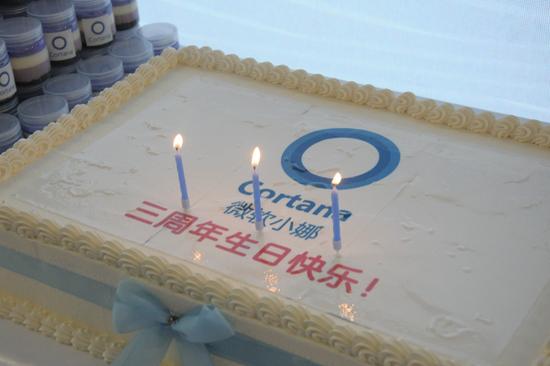
Text / Bai Xin
Microsoft Xiaona, now three years old, represents a key part of Microsoft's longstanding commitment to artificial intelligence. Despite being a pioneer in technology for 42 years, Microsoft continues to innovate, with Xiaona playing a vital role in its AI strategy.
Recently, NetEase had the chance to sit down with Baogang Yu, the Executive Vice President of Microsoft's Asian Internet Engineering Institute and the head of the Bing and Xiaona project teams, to discuss Xiaona's evolution and the broader implications of Microsoft's AI initiatives.

The latest iteration of Xiaona focuses heavily on enhancing productivity and catering to professional environments. When Xiaona first launched, the market for smart assistants was still nascent. Today, major tech giants are scrambling to establish their presence in this space. The newest version of Xiaona introduces a sleeker interface, streamlined reminder lists, and an innovative lock-screen plug-in feature available on iOS for the first time. Additionally, Xiaona's accounts can now seamlessly integrate with Microsoft's suite of office applications. These updates reflect a shift in Xiaona's focus, moving beyond personal tasks to provide more intelligent solutions for work-related challenges. Xiaona can now intelligently parse email content, extracting key information and suggesting timely reminders to users, making it a powerful tool for managing professional communication.
Unlike competitors like Amazon or Apple, which have focused on standalone devices or single-platform applications, Microsoft has explored a broader range of AI applications. Xiaona now boasts over 145 million users globally. Rumors about Microsoft releasing its own smart speaker have gained traction, and Baogang confirmed that such a product will indeed hit the U.S. market this fall.
When asked about Xiaona's competitive edge, Yu highlighted three distinct advantages: its AI technology, its focus on professional scenarios, and its relationship with Bing. First, Xiaona's strength lies in its integration across multiple terminals, supported by three years of user feedback and data analysis. Secondly, Xiaona's mission is to improve efficiency in professional contexts, leveraging Microsoft's extensive corporate user base to deliver tangible value. Lastly, Bing's strong presence in the U.S. search engine market positions it as a valuable knowledge source for Xiaona's capabilities, enabling deeper and more comprehensive answers to user queries.
Microsoft Xiaona embodies Microsoft's vision for intelligent technology. As part of its broader AI strategy, Xiaona represents a critical component of Microsoft's future innovation. The successful implementation of AI requires expertise in three areas: understanding the world, understanding work, and understanding users. Xiaona is evolving in these directions, and Microsoft remains committed to significant investments in research and development.
The Chinese government's increasing focus on AI as a national priority has generated excitement within the industry. In July 2017, the State Council released a plan to synchronize China's AI capabilities with global leaders by 2020. By fostering an ecosystem of AI innovation, the plan aims to create a trillion-yuan industry and establish foundational standards and services. This move has inspired confidence among tech leaders like Yu, who sees it as a testament to the growing importance of AI in China's economy.
Microsoft's commitment to AI has been evident for years. Last October, the company restructured several divisions under Dr. Xiange Shen's leadership, forming a dedicated AI research team with thousands of employees worldwide. Earlier this year, the Xiaona team expanded further, reflecting Microsoft's deepening investment in AI. Yu emphasized that the company's resources and focus on AI represent a long-term commitment to advancing intelligent systems.
While domestic giants like BAT and Lenovo have also entered the AI arena, Yu believes this collaborative effort benefits everyone. He noted that the collective push toward AI adoption creates opportunities for the entire industry. Furthermore, Yu emphasized the importance of nurturing talent, highlighting the influx of AI professionals from Microsoft to companies like Baidu and Tencent. While this talent migration presents challenges, Yu sees it as a positive sign for the industry, fostering widespread AI awareness and skill development.

Will voice assistants eventually replace platforms like WeChat? While voice assistants remain less common in China compared to their international counterparts, they offer unique potential. However, Yu believes that personalization is key. He cited his experiences with Amazon's Echo in foreign markets, noting how usage scenarios differ across cultures. For instance, while smart speakers are often used in kitchens abroad, this scenario might not translate well to China due to differences in daily habits. Yu emphasized that AI assistants must adapt to local contexts to succeed.
As the head of Xiaona's mobile initiative, Yu shared his insights on the challenges of building an AI-powered assistant. He stressed that focusing on efficiency has been central to Xiaona's success, but achieving this requires identifying clear use cases. From early experiments with casual interactions like jokes and music, Xiaona has evolved to address more practical needs. Yu acknowledged that AI remains a complex field, requiring continuous refinement and adaptation.
Every Microsoft product now incorporates elements of AI, from gaming consoles to operating systems, search engines, and office tools. The goal is to make AI ubiquitous, integrating it into everyday life and work for individuals and businesses alike. Microsoft's vision extends beyond individual innovations to a holistic approach, aiming to empower users through intelligent solutions.
Guangzhou Yunge Tianhong Electronic Technology Co., Ltd , http://www.e-cigaretteyfactory.com